Affiliate marketing drives 16% of all internet orders. 80% of brands build an affiliate program to boost recognition and sales.
These statistics show the strength of affiliate marketing in growing your business.
For startups, affiliate marketing helps increase your brand’s reach and sales in a cost-efficient manner. It allows for growth without the high costs often linked to big marketing campaigns.
So, what should you learn about affiliate marketing for startups? Keep reading to find it out!
What is Affiliate Marketing?
Affiliate marketing is a marketing model that merchants can use to grow their business. In this model, you partner with others, known as affiliates.
They promote your products or services via their platforms like websites, social media pages, or video channels. When they bring sales, you pay them commissions.
This model allows you to pay only when you have results. Such an approach is cost-effective and low-risk.
Leveraging the resources of affiliates will also help you reach a wider audience. It’s a great way for startups to expand their market without spending much on advertising.
Thanks to beneficial characteristics, affiliate marketing develops so quickly. Its market size reached $27.8 billion in 2023.
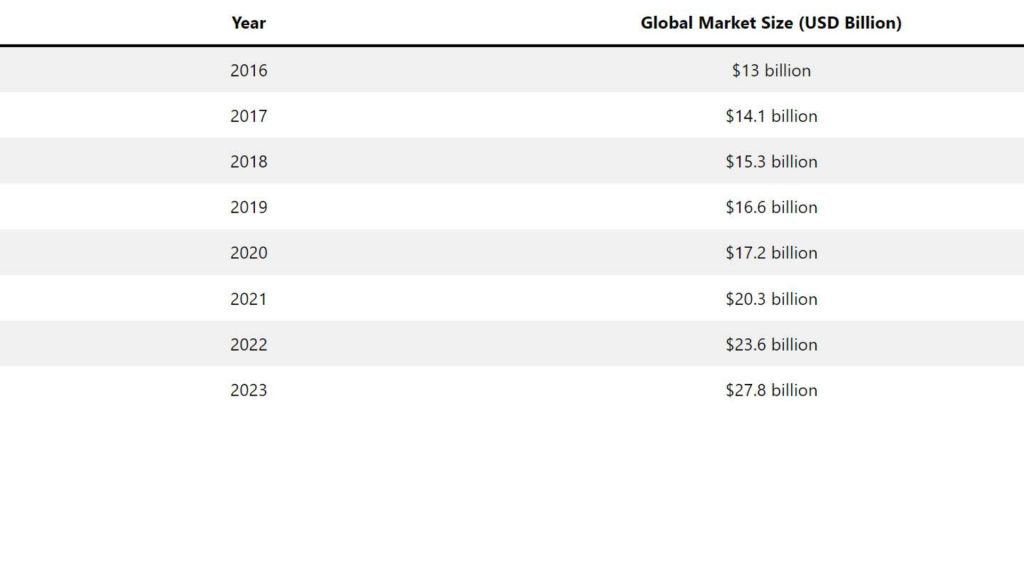
How Does Affiliate Marketing Work?
Affiliate marketing is simple and direct. Here’s how it works:
As a merchant, you start by setting up an affiliate program. This program is the frame for you to work with affiliates. You will need to decide on things like joining conditions, cookies, payouts, and, most importantly, commissions.
Commissions are the portion you pay affiliates for the sales they make. It can be a fixed number or a percentage of sales or orders. For instance, if you offer a 5% commission on a $200 product, your affiliates can enjoy $10 for each sale.
Affiliates then join your affiliate marketing program and promote your products or services. They share affiliate links on their marketing channels like social media, websites, or blogs. Social media influencers may share the links on their accounts.
When someone clicks on such links and buys something, the affiliate gets their commission. You track these sales through affiliate software. The software lets you see which affiliates bring in sales and how much to pay them. It also helps you to track and record other metrics to manage and optimize your program.
Why Startups Should Try Affiliate Marketing?
So why is affiliate marketing a great choice for startups? Let’s see how it can help your business!
Low barriers to entry
Affiliate marketing stands out for startups because it’s easy to start. It doesn’t require too much, for example, a huge investment.
The key advantage is its performance-based model. You only pay affiliates when they make a sale. This means you spend money only when you see results.
Moreover, you decide the commission rates for affiliates. This characteristic allows your business to manage risks by setting affordable numbers.
For affiliate marketing, you don’t need a big team. A few staff can effectively manage your affiliate program thanks to software or networks. This is ideal for startups where resources are often limited.
Enhance social proof
Social proof is a concept about consumer behavior. It shows how people look for and copy the recommendations of others when purchasing something. So, social proof can have a great influence on purchasing decisions.
97% of consumers seek reviews before making a purchase. The majority of them check around one to ten reviews. These numbers show the critical role of social proof in marketing.
For startups, stepping into the market and building a reputable brand are significant challenges. Here, affiliate marketing becomes a great option.
Your affiliates will spread the word about your business. This will make more consumers recognize and trust your products or services. It’s especially right when it’s an endorsement from trusted affiliates.
Their audience, who trust them, will believe in their recommended offerings. That’s how affiliate marketing improves your social proof. It’s very effective in building a brand’s credibility.
Reach a larger target audience
Affiliate marketing can help startups to expand their market reach in many aspects.
Firstly, by leveraging the networks of affiliates, you can reach more people. Affiliates, with their already built-in audience, will connect your products to broader customers.
By collaborating with affiliates, you can grow your brand recognition. Your visibility will increase a lot when you have a diverse affiliate network. Publishers in the network create content about your business on many platforms.
Secondly, affiliates’ introduction also leads to more traffic to your site. Thus, your rankings on search engines increase, and then more users come to your site through organic search channels.
Thirdly, your products can gain exposure to various market segments thanks to affiliates. This helps your business in exploring new customer segments.
Affiliates can recommend your brand to new circles, depending on their followers. This expansion allows you to break into markets and demographics you might not have been able to reach before.
Affiliate marketing is also a cost-effective approach to broaden your target audience. You don’t need to pay affiliate partners when they create content about or introduce your products.
You only pay when they bring sales. So, it’s an efficient way to target a larger audience that doesn’t require a big advertising budget.
Startups have limited budgets. Affiliate marketing offers a practical solution for them. It helps them grow their customer base while keeping costs low.
Zero/minimal costs
One of the best things about affiliate marketing is the low cost. It stands out when compared to paid ads and hiring a marketing agency.
This model only requires payment when sales happen. There are no upfront costs like PPC advertising. It also enables you to earn up to 15 pounds for each pound spent, making it a low-risk investment with high returns.
This is great for startups with limited budgets. It means you can grow your business without spending a lot of money. It is not only cost-effective but also risk-free.
The main expense is setting up your affiliate program. However, this is accessible to almost all businesses thanks to software like UpPromote.
Potential Revenue with Affiliates (UpPromote)
Estimate the potential revenue when you recruit affiliates: comparing Current Business and Business + UpPromote.
Estimated Impact
Quickly visualize how affiliates can boost your orders and revenue.
Revenue Comparison: Current vs. with UpPromote
The chart illustrates relative revenue growth comparing two scenarios: organic sales vs. organic + affiliate-driven sales.
- Affiliate traffic quality is equal to your current traffic.
- AOV and Conversion Rate remain stable.
- Does not account for churn, refunds, or potential upsell/cross-sell.
Such software makes it easy to start. They offer plans starting at just $29.99 per month, and there’s even a free version for those just beginning.
The affordable cost makes affiliate marketing a practical and manageable option for startups. It helps to expand their marketing efforts without significant financial burden.
Track data for better improvement
One of the benefits of affiliate marketing is the capability to monitor and analyze data. This trait allows startups to closely monitor sales and performance. It helps them improve their overall results.
You adopt affiliate programs via affiliate software or networks. Such software or networks will collect data related to your program and display it for your view. Thanks to them, you can see many useful metrics and deeper insights into target customers.
You can identify which affiliates are generating the most sales. Then, you can give them rewards. This helps you build long-term relationships with them. It will lead to better results in the future.
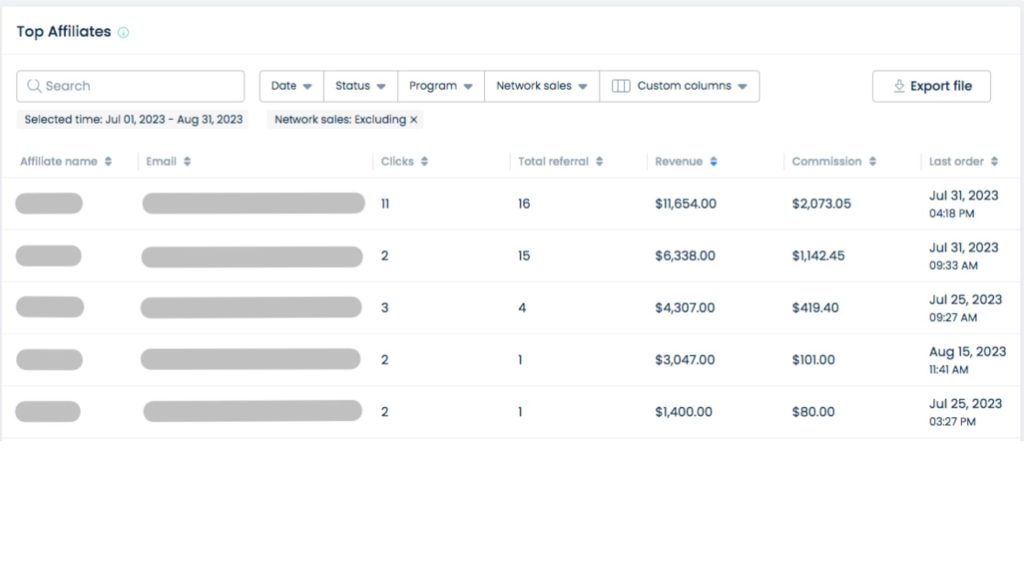
When realizing such affiliates, you can also observe how they attract customers. This will help you promote and earn more potential customers as well.
If you have many products, affiliate marketing data also lets you know which resonates with customers. Thanks to this, you can adjust your inventory and marketing focus accordingly. In other words, this insight drives you to make informed business decisions.
Startups are usually newcomers in a market, so useful data will be very beneficial. The data can help startups to understand the market and customer preferences.
Affiliate marketing can bring a lot of information. It helps to decide on products and marketing. It supports growing your business in the right way.
When Is A Startup Ready for An Affiliate Program?
Deciding when to start an affiliate program is also essential for your program’s success. You can consider the following aspects:
Completed products/services
Of course, before starting an affiliate program, you must have completed products or services. Using an incomplete product for offerings might affect both your and your affiliates’ credibility.
A fully developed product will also ensure customers receive exactly what is advertised. If your affiliates promote in a great way, but your product isn’t market-ready, it can be a disaster.
It will downgrade customer satisfaction. It also brings negative reviews to your product and your brand. In this way, affiliate marketing with a wide reach will have an adverse effect.
Awareness of your financial condition
Affiliate marketing doesn’t need much money. But you should know your finances before joining. As a startup, we must consider every cost.
You also need to know the investment cost and profitability. You need this to estimate the break-even point and profit margin when launching affiliate marketing.
You will need the budget to pay the commission rates for affiliates to keep the program. You will also handle any extra expenses incurred. Financial readiness is crucial to ensure the smooth operations of your program.
Marketing assets readiness
When your affiliates join your program, they will need marketing materials. They will use these to promote your products or services.
Ready-to-use marketing assets also help them. They help them advertise your brand in a consistent way. So you should have already prepared them before launching the program.
The assets can include product descriptions, images, banners, and other promotional materials. It should be easy for affiliates to access and use.
Well-prepared marketing assets contribute to you and your affiliates in marketing the offerings. They also play a crucial role in conveying the brand’s recognition and messages.
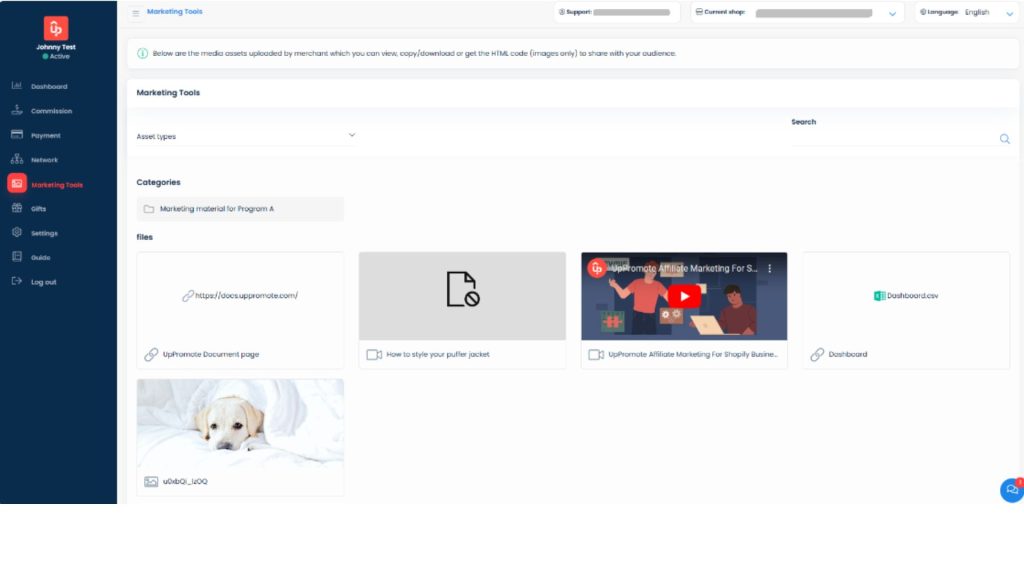
Infrastructure Preparedness
The infrastructure also needs to be ready before starting your affiliate program. It consists of elements for managing your program and handling sales driven by the program.
About affiliate management, you will need to decide on using software or networks for the program. Regardless of which one you use, it should be smooth in hosting creatives, tracking, reporting, and paying affiliates.
In addition, your website needs to be strong enough to manage increased traffic. You should also have a customer service team to handle larger orders. Your fulfillment process also needs to be ready for the increase in orders.
A strong foundation in place is essential for supporting the growth that comes with a successful affiliate program. Without it, you may face troubles arising during your program’s implementation.
Best Practices to Start Affiliate Marketing for Startups
Discover the best practices that will help to bring your program to success in this part! Keep scrolling down!
Plan your goal and KPIs

Goals and KPIs are among the first things that need to be considered when thinking about running an affiliate program.
Affiliate program goals depend on your business goals. They can be increasing sales, expanding brand visibility, or growing your customer base.
Setting goals will help you to monitor and measure whether your program is going up. They will also be the foundation for making decisions related to your program.
When setting your goals, keep in mind the formula SMART: S (Specific) – M (Measurable) – A (Attainable) – R (Relevant) – T (Time-based).
KPIs are essential measurements for specific goals in affiliate marketing. Starting affiliate marketing without understanding KPIs will lead to ineffectiveness.
These indicators include conversion rates, average order value, cost per acquisition, and so on. Accurate KPI data lets you optimize your affiliate program. This leads to better efficiency and success.
It’s important to ensure that your KPIs align with your goals. This alignment helps in evaluating the performance of your program.
Select the right affiliate program software
Affiliate marketing software is a nice option for running your affiliate program. It enables you to set up and manage your own program directly. This approach gives you full control over various aspects of affiliate marketing operations.
The software facilitates the creation of affiliate links and oversees the tracking of sales and activities. You can invite marketers to join your program, allowing them to promote your products. In return, they earn commissions on sales generated through their unique links.
This software should align with your startup’s specific needs. It should offer functionalities like efficient tracking of affiliate sales, easy payment processing, and real-time reporting.
When selecting software, you may consider user-friendliness, reliability, and scalability. The software should grow with your program and handle increasing data as your startup expands.
UpPromote is the software you can consider for managing your program. With UpPromote, you can start at a low price, like $29.99, or even try a free plan at the start. When your program expands, you can use a higher package with stronger features to handle it.
Set up a suitable commission structure
Having an effective commission structure will contribute to the success of your affiliate program.
An appealing commission model encourages affiliates to focus on your offerings. It also helps in building a productive affiliate network, contributing to your business’s growth.
When deciding on a commission model for your program, it’s important to weigh the options carefully.
Models like pay-per-click or pay-per-impression may pose a higher risk of fraud. A safer and more effective approach could be to offer commissions based on actual sales. This could be a fixed amount or a percentage of each sale.
To make your program more attractive, consider offering competitive commission rates. Compelling rates will make affiliates actively promote your products.
For instance, implementing a tiered commission structure can be advantageous. Offering attractive commission levels will not only help to have more affiliates but also motivate them to bring in more customers.
Of course, the commission needs to strike the right balance between being competitive and sustainable. That’s for drawing in high-quality affiliates and supporting your startup’s long-term growth.
Create an affiliate agreement
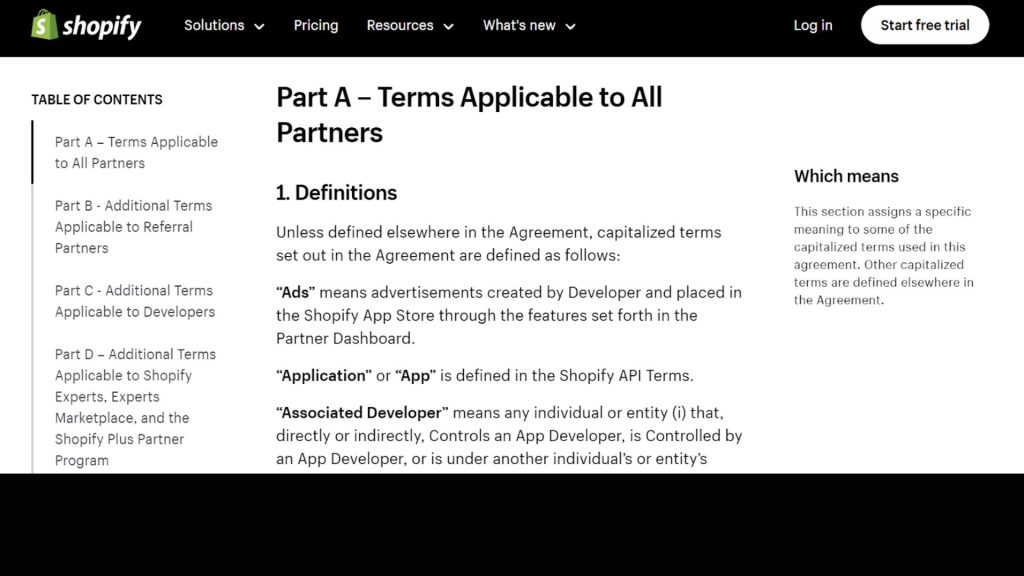
Making an affiliate agreement is a fundamental step in setting up your program’s framework.
A well-prepared agreement will clarify the rules and expectations. This ensures affiliates joining your program will be on the same page with you.
It also helps to reduce the likelihood of misunderstandings or disputes in the future. Moreover, it builds trust and confidence among your affiliates. With clear regulations, affiliates can be rest assured when participating in your program.
So, what should be included in an affiliate agreement?
It should outline the key components of your program. They can be the commission structures, the cookie duration, the payout terms, and the rules for brand representation.
Other provisions can be included, like termination clauses, reporting and tracking, liability, dispute resolution, etc.
A clear agreement establishes a transparent and reliable foundation for partnership. It not only protects your business but also demonstrates your commitment to maintaining a mutually beneficial relationship with your affiliates. It fosters a strong and productive partnership.
Have a clear recruitment plan
An effective recruitment plan is crucial for a successful program. You’ll need to adopt a strategic approach to recruitment.
You can leverage social media like Facebook, Instagram, and YouTube to discover potential affiliates. Leveraging their algorithms and search features can be a nice idea.
Attending industry conferences and meetups for face-to-face networking also works. Or you can use affiliate marketplaces such as UpPromote to find and connect with suitable affiliates.
You can also engage in blogger outreach through Google searches and direct communication.
Lastly, don’t forget to motivate current affiliates to refer new participants. Make it by offering competitive commissions, utilizing UpPromote’s MLM feature for enhanced incentive structures.
Choose the right affiliates to work with
Partnering with appropriate affiliates helps 60% of major merchants earn affiliate profits of $5 million or more. That’s great, right?
To have big success with your affiliate program, choosing the right affiliates is necessary. But how do you identify your ideal affiliate partners?
Firstly, you should know your audience and seek affiliates whose audiences align with yours.
You must clearly understand your customer persona. The more detailed, the better. Once you have a clear picture of your target audience, look for affiliates who attract similar demographics.
Aligning with such affiliates, you’re more likely to engage with potential customers. This alignment ensures a higher relevance of your marketing activities and increases the chances of reaching true customers.
Quality should also be a factor when selecting your affiliates. Before deciding to partner with them, you may review their content. This screening ensures that their work aligns with your brand’s standards and messaging.
Besides, affiliates should also have consistency in content creation. Ideal ones should regularly produce high-quality content that engages and attracts their audience.
By focusing on affiliates who produce both high-quality and consistent content, you can enhance the effectiveness of your affiliate marketing efforts.
Support and train your affiliates
Your affiliates need to understand your products and brand’s messages to promote effectively. So it’s necessary to provide them with training sessions or documents to equip them with that knowledge.
A good affiliate program can’t lack marketing materials for affiliates. High-quality resources will help them to enhance their performance and bring more customers to your business. It will also assist you in upholding brand consistency on the sharings about your products.
You can provide them with website banners, product images, social media graphics, or other creative assets. These are useful resources for affiliates.
Besides, you should regularly update them on changes in existing products or new product launches. Don’t forget to build communication channels with them so that you can support them or give advice whenever they need it.
Your affiliates’ success will be your success. Helping them maximize conversions helps you earn more profits.
Implement data tracking
Data tracking is vital for any program, especially programs of startups. Without it, you can’t assess your program’s progress or success.
By monitoring main metrics such as click-through rates, conversion rates, etc., you gain a clear picture of your program’s performance. The data gives you insights into your program. They help you to understand what the good areas are and what needs to be improved.
With these insights, you can make informed, data-driven decisions to optimize your affiliate program.
For example, when you understand which affiliates are performing well, you can actively build strategies to foster long-term relationships with them. Knowing which products resonate with customers can help you focus and develop your suitable products.
All-in-one software like UpPromote can allow you to track data well. It acts as a centralized hub for tracking and analyzing affiliate performance.
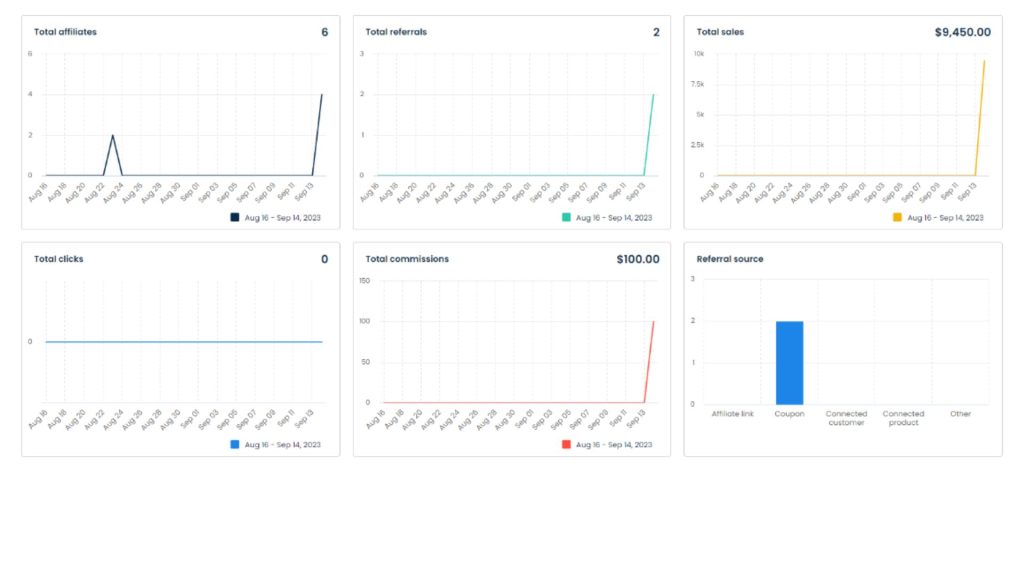
It offers real-time reporting on key metrics. It enables you to identify top-performing affiliates. Also, it can help to evaluate the success of campaigns and understand program efficiency.
With features like automated commission calculations and communication tools, the software improves operational efficiency and fosters collaboration between merchants and affiliates.
Regularly review and improve result
If you have full data but you don’t analyze it to improve your strategy, such data will be useless. Regular analysis ensures that you adjust your strategy to meet market demands and maximize returns.
The process of assessing and adjusting is crucial for the continuous improvement and long-term success of your affiliate program.
Thanks to the information and data collected, you can see which areas require improvement. This might be revising your recruitment strategies to attract broader affiliates, adjusting the commission structure to be more effective, improving your support to affiliates, etc.
Regular evaluation and adaptation ensures that your affiliate program remains dynamic. It also helps to ensure the program is aligned with your business goals while being responsive to changes or trends.
Affiliate marketing for beginners FAQs
- Is affiliate marketing worth it for beginners?
Yes, it is. Affiliate marketing is very beneficial for startups because its advantages are aligned with startups’ characteristics.
It’s performance-based with low risk and cost-effectiveness. So it’s convenient for businesses with tight budgets.
It brings broader reach, grows brand awareness, and helps to scale significantly. That’s quite a great help to startups that have just broken the market.
Affiliate marketing also enhances trust and credibility among the audience, which startups need.
Thus, affiliate marketing for startups offers a valuable and efficient pathway to grow their business.
- How a beginner can do affiliate marketing?
As a beginner, you should understand the basics of affiliate marketing. Then, you can follow the best practices mentioned above.
Start by setting specific goals and identifying your target audience to ensure alignment with suitable affiliates. Opt for efficient Shopify affiliate software for tracking and management.
You have a transparent recruitment plan and find the right affiliates for your program. Building an attractive commission structure is also necessary. Providing training, support, and high-quality marketing materials for your affiliates is important, too.
You also need to make a clear affiliate agreement outlining the program’s terms. Then, implement data tracking, regularly review, and optimize the program to ensure its effectiveness.
- Does affiliate marketing work for small businesses?
Yes, it does, as long as it goes with careful planning and execution.
It provides a cost-effective method to expand market reach and increase sales without paying much for advertising. The model of affiliate marketing also reduces financial risks for small businesses.
Partnering with affiliates also helps small businesses to tap into new customer bases. It quickly increases brand visibility.
In general, affiliate marketing can bring lots of advantages to small businesses. With the right partnerships, they can build effective competition in their market.
Conclusion
To conclude, affiliate marketing for startups is a great solution for them to develop their business and have higher profits.
By leveraging the power of affiliate networks, startups can enjoy many benefits, such as extending reach, improving brand awareness, and driving sales with a minimal initial investment.
Of course, startups should implement the right approach to get the best results for growing business. It can include planning goals and KPIs, recruiting affiliates, building effective commission structures, etc.
In short, affiliate marketing is worth trying for startups. If you haven’t implemented this marketing model, consider adding it to your business strategy!







